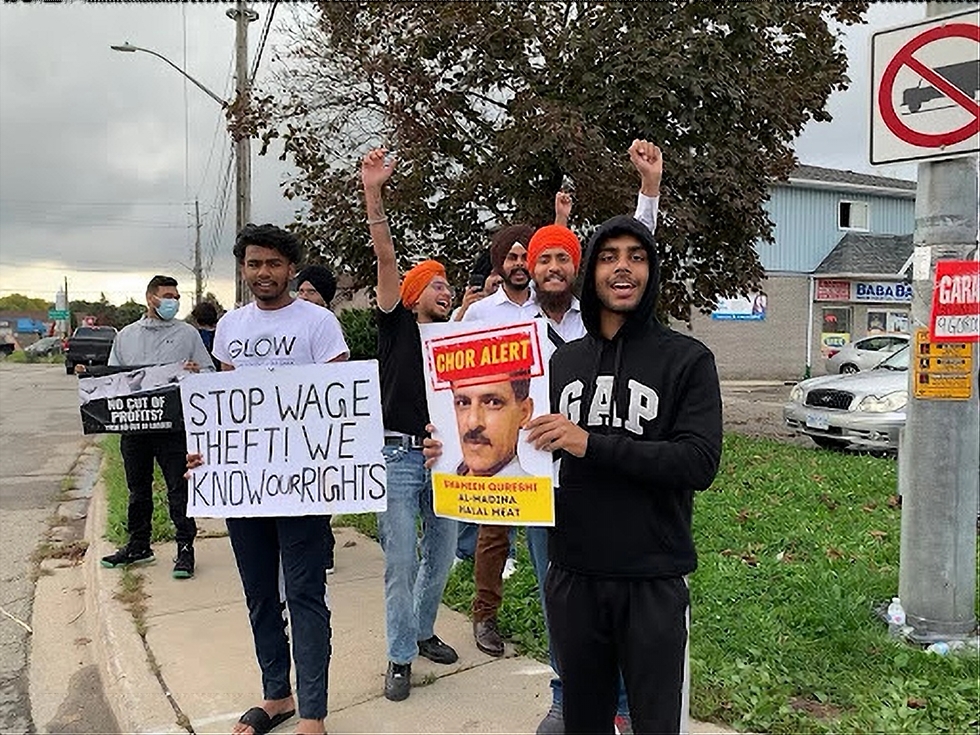In a gritty industrial area of Cambridge, Ontario, an unusual protest was staged outside the Al-Madina Halal Meat Shop. More than 40 protestors armed with banners and a loudspeaker distributed leaflets in an attempt to shame the business owners into settling their debts with a former employee.
The protestors, with the Naujawan Support Network, were there to demand payment of more than $8,000 in alleged unpaid wages to Rohit Uppal, a butcher at the shop.
Prior to the protest, a few of the demonstrators had met with owner Shaheen Quereshi and his son Arsalan to try and negotiate a last minute settlement. But talking got them nowhere, so they began a campaign of actions to embarrass the owners.
The Quereshi family told New Canadian Media they did not want to comment on the matter.
Vulnerable immigration status
Over the past four months, NSN, a grassroots organization, has waged several similar campaigns on behalf of workers in front of businesses and homes of alleged “wage thieves.” The group claims it has so far recovered more than $17,000 in wages for workers since July.
NSN, a collective of international students and workers that includes Simran Dhunna, has jolted the South Asian community in Peel Region by highlighting the problem of wage theft by unscrupulous business owners.
Over the summer, during local rallies in support of Indian farmers’ protests, Simran met dozens of international students who were being exploited by businesses and landlords who took advantage of their vulnerable status in Canada.
She says NSN members found it intolerable that while Canadians were fighting to get justice for farmers in India, foreign students were being exploited in Canada.
“As a community, we had come together to highlight the injustice farmers were facing. We decided that we needed an organization to fight against the exploitation of international students and workers right here,” she says.
Simran says wage theft is committed in many forms.
“International students can legally work 20-hours a week, but a large percentage of South Asian students are forced by economic circumstances to seek employment with employers willing to pay them under the table. Many employers routinely pay less than minimum wage and compel these workers to work overtime with little or no additional pay.”
Students at the protest told NCM that wage theft is “rampant” in the trucking industry, in logistics companies, on construction sites and restaurants.

Rohit Uppal’s lost wages
Uppal sought to find work during his transition from temporary residence to permanent residence. He is seeking a total of $8,305.57 from Al-Madina Halala Meat Shop in what he considers unpaid wages.
After he got his business diploma from Conestoga College, Cambridge, the 21-year-old started work as a butcher in May, 2021 at Al-Madina. He was paid $15 an hour for 30 hours and $10 an hour for any additional work.
“When the driver of their refrigerated truck quit, I was told to take over even though I told them I had a G-2 licence. (Operating a truck requires the higher credential of a full G-licence). I had a small accident which caused damage to the truck and to the other driver’s car. My wages were being delayed and after many weeks, Arsalan Qureshi told me that I had to pay for the damages since I was not insured to drive the truck,” he says.
Uppal said when he protested, Qureshi threatened to send an email to immigration officials “to ruin his application for permanent residency.”
During the protest, this NCM reporter met the Qureshis, though they refused to comment on the issue, instead directing questions to their lawyer Maneesh Patel who refused to comment on the matter as it was heading to court.
Last resort
Such threats are the reason why hundreds of international students do not pursue legal action against deadbeat employers.
Arshdeep Singh, a former international student victim of wage theft says it is the most common problem facing international students.
“Students don’t have the $800 court fee to pursue the matter in civil court, and hiring a lawyer costs a minimum $2,000. More so, many employers ignore small claims court orders to pay their staff back wages, so the only successful way we find is to shame these wage thieves by protesting outside their homes and businesses,” he says.
While international enrolment increased in all provinces, nearly half of all students study in Ontario. Indian students make up 67 per cent of that group.
A large number of these students have no choice but to work an average of 40 to 60 hours a week in order to repay loans taken out by their parents in India as well as pay high rents for their accommodation.
Given their precarious status in the country, it is no surprise that this exploitation continues. These protests by NSN designed to shame status conscious business owners in their own neighborhoods may be the only tool they have to fight back against exploitation.
According to Simran, in some cases, the protests have forced business owners to back down and pay their former employees.
“When that happens, we announce it on our social media accounts. Our goal is to ensure there are consequences for business owners who steal wages and landlords who exploit their tenants,” she says.
While many within the South Asian community support the objectives of NSN, the tactics employed elicit mixed reactions. According to Bhinder Singh, a well-known commentator and occasional host on Punjabi radio and TV programs, some of the employers who’ve been at the receiving end of NSN protests feel unfairly targeted.
“Many in the community feel that protests outside the residences of business owners they claim are cheats go too far. There are two sides of the story,” he says.
Simran says NSN is undeterred by the pushback from people with vested interests.
“We only protest outside businesses and homes of these wage thieves after we’ve tried to negotiate a settlement,” she says. “It is the last resort for exploited workers.”
This article was written as part of the ‘NCM – Village Media Advanced Training and Mentorship for Immigrant Journalists’ special project.
Pradip Rodrigues began his career as a journalist at The Times of India, Mumbai. Since moving to Canada in 2000, he has written for several media outlets both here and in India on a variety of issues. Prior to joining NCM, he was at CanIndia newspaper for eight years.





